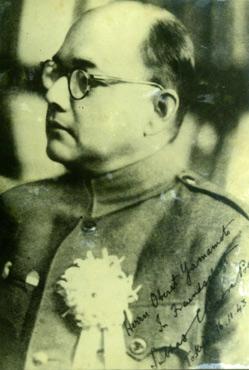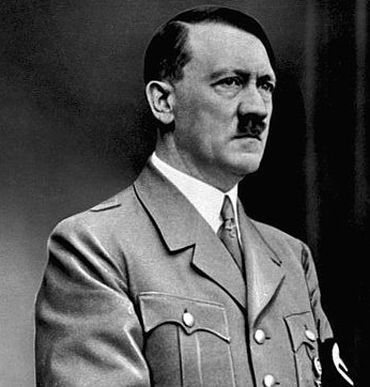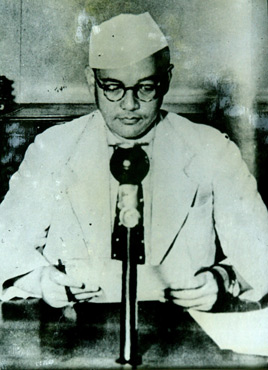 | « Back to article | Print this article |
'Netaji was able to both respect and transcend religious differences'
In 1941, at the height of the Second World War, Subhas Chandra Bose went to Germany to seek Adolf Hitler's help in organising an Indian army to fight their common enemy, England. In the third part of his four-part interview to Arthur Pais, biographer Sugata Bose talks about Netaji's time in Europe.
Part I: Grand nephew turns Netaji's biographer
Part II: 'Netaji had a romantic, deeply emotional side to him'
Let us talk about Netaji in Europe, and his outlook towards people of different religious and ethnic backgrounds.
In the 1940s, Subhas Chandra Bose gave up his earlier inhibitions about meat and other food restrictions and so on, but remained essentially the same man in terms of his values.
His biggest achievement in public life was to bring about the unity all of the religious communities of India: Hindus, Muslims, Sikhs and Christians. Mahatma Gandhi also brought about unity among Hindus and Muslims; but Subhas actually believed in the possibility of what he described as cultural intimacy among the different religious communities of India.
That is why he was very keen that the members of different religious communities should learn more about the religious faiths and practices of other communities; and on ceremonial occasions take part in the celebrations.
He felt that on Muslim festivals, Muslims may actually invite Hindus and vice versa.
Actually, I found it very moving to write the small passage that I have on the construction of a memorial to the fallen heroes of Indian National Army. It was designed and built by Cyril John Stracey, an Anglo-Indian officer of the INA.
Subhas Chandra Bose met him on August 15, 1945, and examined the designs for the memorial. He asked Stracey if the memorial could be completed before the British landed in Singapore.
"Certainly, Sir," Stracey replied, and with a salute and 'Jai Hind' marched off to build the edifice in record time. It would bear the INA motto Itmad (Faith), Ittefaq (Unity), and Qurbani (Sacrifice).
Subhas was really a very broad-minded man. He himself had been deeply influenced by Vivekananda. He himself was a devotee of the Mother Goddess.
But he never made a display of it. And in my book I have quoted SA Ayer, who said that Netaji never spoke his God, he lived Him. He married someone who was a Christian, a Catholic.
When he was going on his submarine voyage, the one companion he chose was a Muslim. When the INA Memorial had to be built, it was a Christian officer who was given the task.
So, he was someone who was able to both respect and transcend religious differences. And, when he writes to Emilie in March 1936, he says that he has forgotten all these differences of Indian and European and what I love is really the woman in you, the soul in you.
Click NEXT to read frurther...
'He had the courage to criticise Nazi policies while in Germany'
When Shyam Benegal's film Netaji, the Forgotten Hero was released, some people did not like the title.
Shyam's initial idea was to call the film The Last Hero. Bose hasn't quite been forgotten. He became a legend. But I felt his actual life and work were sometimes genuinely forgotten. I wrote this book because I felt that the life was more fascinating than the legend.
There was a little too much of myth-making around him and I felt that his actual life story narrated well would present the real Netaji Subhas Chandra Bose to a younger generation. The myth-making consisted of simply worshipping him as a warrior hero, leaving aside all of the other important facets of his life and personality.
But, to return to the question that you asked about the leftists and their attitude towards Bose and how they came to dislike him for many decades. In fact, the Communists had more or less worked with him reasonably well even in the late 1930s, when they were trying to bring about left consolidation within the Indian National Congress.
The communists in those days were operating under the label National Front. But then the communists decided overnight that the Imperialist War had been turned into a Peoples' War when Germany invaded the Soviet Union.
Once Netaji allied with the Japanese, he was denounced as a Japanese stooge by the then communists who took a very hard stand against him. I think they recognised over the decades that this man had such a great popular appeal that they undercut themselves if they continued to criticise him.
And, I remember the first time that Jyoti Basu made a speech in January 1978 on his birthday and said the time had come for the left to reassess Subhas Chandra Bose.
Among those who really know what Netaji was all about from the letters that he wrote, it became clear that sitting in wartime Germany he was writing to the German foreign minister, criticising in the strongest terms Germany's invasion of the Soviet Union.
We have all the correspondence and the transcripts of the speeches he made criticising Nazi Germany in the 1930s and the 1940s. So here was a man who had real courage to criticise Nazi policies while in Germany.
His letters and speeches show that he never compromised on India's dignity and India's interests. So, once all this began to come out, the leftists had to accept the facts. And now with my book these facts will, hopefully, become even more widely known.
Click NEXT to read further'He described the Japanese as the British of the East'
Did Bose spend sleepless nights thinking that in spite of his alliance with the Japanese, there could be a time when the Japanese would add India to its conquests?
What is fascinating is that just as he criticised Germany in the mid-1930s, he had in a letter to Kitty Kurti described the Japanese, way back in 1934, as "the British of the East".
When Japan invaded mainland China in 1937, he was very critical of Japan, and as Congress president, he sent a medical mission to help the Chinese in the face of the Japanese invasion.
He had hoped for Asian unity; for some sort of an Asian universalism to be realised and he felt dismayed two of these Asian powers -- Japan and China -- were falling victim to the same kind of nationalist rivalry that had torn apart Europe during World War I.
He admired Japan for its achievement until the early twentieth century. But he was opposed to this kind of nationalistic imperialism and the humiliation of another proud Asian country.
Now, during Second World War, of course, he was taking advantage of the international war crisis. Again, he was able to do in Southeast Asia in a much bigger way what he had attempted to do in the first instance in Europe.
This was because there was a much larger number of Indian soldiers that had surrendered to the Japanese, and the Japanese had said that if you fight for India's freedom then you will not be prisoners of war, even though there were tensions between the Japanese and the Indians.
And the other advantage of being in Southeast Asia was that there was much larger social base of civilian support, a much larger Indian expatriate community in Singapore, Malaya, Thailand, and Burma who rallied in very large numbers to the cause of India's freedom.
Subhas Chandra Bose was in some ways allied to Japan but he was also asserting the independence of his movement. He had quite serious arguments with some lower-ranking Japanese officers who could be arrogant, but he felt, I think, that the Indian independence movement that he was leading was strong enough to take a stand against Japan if necessary.
But the first task was to expel the British power from India. If you look at what happened in the Battle of Imphal, at first he had wanted the Japanese to let the British retreat because he was desperate to come into Assam and Bengal and he felt he would have a very large civilian uprising in his support.
But he persuaded himself when the Japanese besieged Imphal, and that if Imphal fell, there would be again a very large number of Indian soldiers who he believed would come over to the side of the Indian National Army, which would enhance his strength not only against the British, but also vis-a-vis the Japanese.
He felt the Japanese were not really in any position to have imperialist designs on India. He was a realist and he could see how far the Japanese were over-extended and in fact by the time he arrived in Southeast Asia, the Japanese were already losing in the Pacific.
All that he needed was the war to last long enough for his Indian National Army to make a decisive breakthrough in India. And look at what happened in Burma.
Initially, Aung San came as one of the 30 heroes with the Japanese but in 1945 he turned against the Japanese. And then in 1946 he turned against the British again.
So all of these Asian nationalists including Sukarno in Indonesia were all trying to advance their own country's freedom struggles, and their own country's interests by taking advantage of this international war crisis.
Bose described the war as a conflict between old imperial powers and the new imperial powers. He had no illusions about the new imperial powers. He simply felt this conflict should be taken advantage of by the colonially oppressed people in their struggle for freedom.
Click NEXT to read further...
'He was a great man, but also had his flaws and failures'
In seeking this alliance, how much of anxiety did he go through?
I think he overlooked the sins of Britain's enemies because he was completely absorbed by the cause of India's freedom. One criticism of him that I have expressed in the book is that he always stood up to the Germans and Japanese when he felt Indian honour was at stake, but he sometimes put on blinkers when it came to the brutality of these powers against their victims.
He was more concerned about the suffering of those people who, for long, had been under the British, French, Dutch or American imperial domination.
Perhaps he could not realistically do very much for the victims of German and Japanese oppression, even though one should also know that he made sure that the Indians and Burmese would never fight against each other even when Indians were continuing to fight against the British and the Burmese were turning against the Japanese.
He also tried to keep the channels of communication open with the Chinese in Malaya who happened to be mostly against the Japanese
What I have tried to do in this book is to capture the greatness of the man. He was a very great man but he was also a human being who had his flaws and failures.
And, I don't think acknowledging his failures takes away anything from the greatness of this man or the greatness of his vision of a world free of imperialist domination. We should retain our critical faculties in assessing his life and work.
I think he was the kind of person who would have appreciated it. But we need not be overly cynical when we write about great figures in history. Sometimes scholars have a tendency towards that.
Subhas Chandra Bose needs to be judged by the same standards as one would judge Franklin D Roosevelt in this country. FDR went and met Stalin in November 1943 and had actually said to him, "It is good to meet you".
Did FDR really believe that it was good to meet someone who was a totalitarian dictator who probably beats Hitler into second place as the biggest mass murderer of the 20th century?
But from the perspective of the national interests of the United States, an alliance with the Soviet Union against Hitler was a strategic necessity. And FDR was the president of the United States of America, which was then the emerging superpower of the world.
And here was Subhas Chandra Bose, a prominent leader after Gandhi alongside Jawaharlal Nehru of a country trying to win freedom. And he felt he had to make certain strategic alliances to pursue the cause of India's freedom.
Did Roosevelt make a big issue of the atrocities that Stalin was perpetrating which he knew of at that stage?
All his writings, all his politics and his entire record suggest that if anything, in ideological terms Subhas Chandra Bose was a left-leaning socialist. He was not a communist but a socialist who talked about the ideology of samyavada, of equality based on harmony.
He wanted a form of socialism that was suited to Indian conditions. He did not want to copy or imitate some of the experiments in Russia. That he was completely opposed to the ideology of fascism becomes very clear if we study his life.
Simply because he made an alliance with the Axis powers to fight for India's independence did not mean he shared their ideology.
Stalin and Churchill were on two sides of the spectrum when it came to their ideological dispositions when they had an alliance against Nazi Germany. And for Subhas Chandra Bose, it was not a simple matter of 'the enemy's enemy is my friend'.
He had taken part in the nonviolent movements led by Mahatma Gandhi for two decades and he had seen that the masses were on the side of India's freedom but not one Indian soldier fighting for the British had come over to the side of the Indian freedom movement.
They were still employed to put down the rebellions against the British Empire all across the globe. He really felt at a climactic movement of India's struggle for freedom the loyalty of these men in arms to the British King-Emperor had to be replaced by a new loyalty to the cause of India's Independence.
And how could he do it unless he had access to these soldiers who happened to be held by the enemies of Britain?



